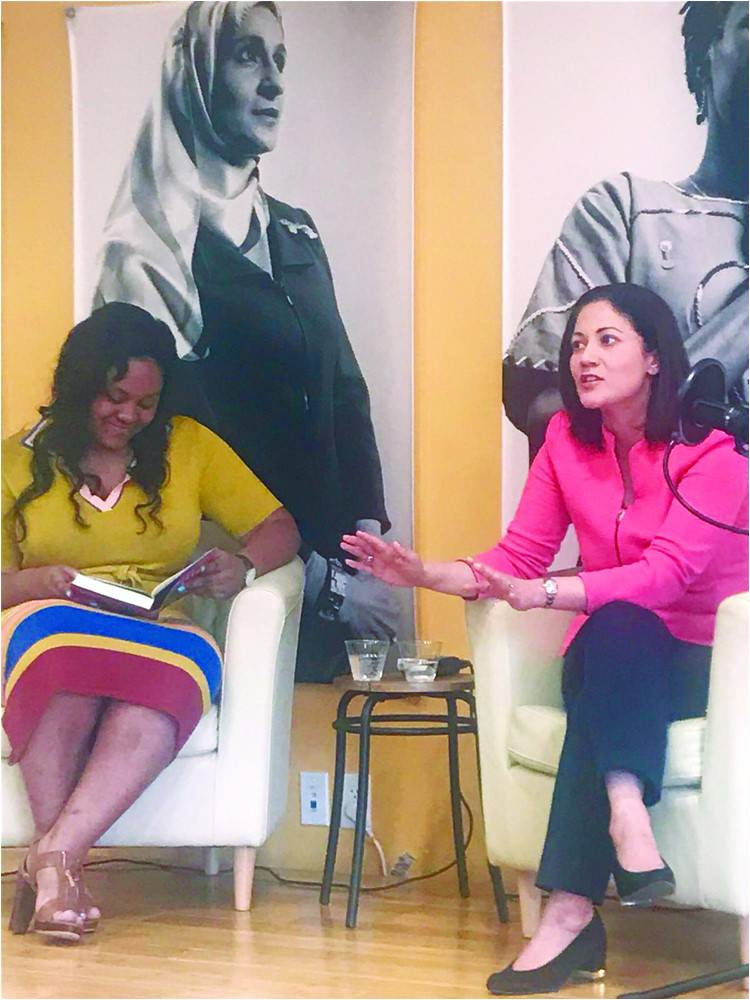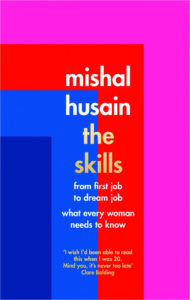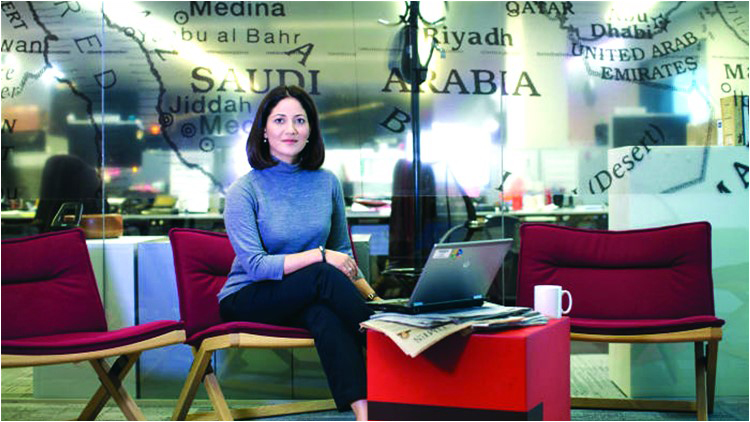
Mishal Husain, the critically acclaimed BBC journalist launched her book in the US recently. The book, The Skills: From First Job to Dream Job - What Every Woman Needs to Know, has been the culmination of the lessons Mishal has learned from her two-decade-long experience at the BBC. As the main anchor on BBC World News, to millions of third-world viewers she became its most acceptable face. During 2002-3, she was based in Washington. Currently, she presents the BBC’s Radio 4 Today program and the BBC News at Ten on Sunday nights on BBC One.
Her job is particularly stressful. It involves crucial make-or-break decisions on a daily basis. It involves retaining one’s nerve, the use of language as a scalpel, and to speak the truth to those in power who are not used to hearing it. Listening to her talk made me reflect on the importance of stepping beyond one’s comfort zone, what it takes to excel, to become a leader in one’s profession- regardless of the field of expertise. To lead, one needs confidence, authority; resilience, the ability to navigate change and the determination to surmount every challenges.
Mishal chose a male-dominated profession – television journalism. She balanced its demands with her responsibilities as a mother of three boys. In this, she is not unique. She did successfully what every working mother faces. Not many educated women feel up to the stress and therefore step away after marriage from careers that might have been equally life-fulfilling.
According to Husain, “luck favors the well prepared, and diligence the determined.” She emphasises the importance of working hard – even when one is not in a dream job – and the power to say ‘yes’ to opportunities that may appear daunting, and planning long term (such as developing a five-year plan), while sacrificing flexibility in the short term. She advises women (and men) aspiring to achieve career success to present themselves with maximum effect both in person and online.
 Many of the lessons Husain shares through her book can be used universally. How to communicate effectively and to advocate for oneself (something many women are reluctant to do) – as well as the need to take a long-term view, even when some plans may not materialize.
Many of the lessons Husain shares through her book can be used universally. How to communicate effectively and to advocate for oneself (something many women are reluctant to do) – as well as the need to take a long-term view, even when some plans may not materialize.
She shares stories of a strong sense of purpose and conviction to highlight certain stories - she was one of the first journalists to be allowed into the Army Public School in Peshawar where 132 innocent young students and their teachers were massacred in a brutal attack. Against a backdrop of bloodied copy books and bullet-riddled school uniforms, she remained calm and controlled, factual even when narrating such a horrific story. She needed to be. She was covering an event in the Muslim world and had to do so with the mind of a reporter and the heart of a mother.
In terms of work/life balance, Mishal is all too aware of the support she has received from the men in her life who have been instrumental in helping her achieve her potential. Her father worked in the Middle East in the 1980s. He sent her to boarding school in the UK at the age of 12. Later, after marriage, she shared with her husband childcare responsibilities for their three young sons. Mishal hopes her experience will inspire them to become successful professionals and equally good parents. As a working mother of two myself, with a similar experience, this resonated strongly.
Mishal’s work at the BBC has taken her from the luxury of Davos to huts for Rohingyas and to overcrowded Syrian refugee camps. She has interviewed prime ministers such as Teresa May and royalty like Prince Harry. She makes her ability to pivot a programme, to ask difficult questions and yet remain graceful under pressure - so skillfully easy that viewers do not always know or appreciate the immense effort involved. Two examples: how she deftly asked the Nobel laureate Aung San Suu Kyi about the human rights atrocities against the Rohingas, and more recently the royal couple Prince Harry and Meghan about the race overtones of their marriage. To pull such interviews off requires curiosity, impartiality, judgement, astuteness, expertise and threading through them a strong nerve. As Mishal admits, a loss of nerve is a sure career killer.

As one works increasingly in a sharp-elbowed world, it is refreshing to see people like Mishal Husain open up about their vulnerabilities and show that even the best of leaders can speak about who they are, why they do what they do and how they keep up heart and commitment in their work profession, despite the inevitable difficulties. This can be hard as vulnerability is often confused with weakness in the workplace.
Walt Whitman wrote that he wrote poetry because he wanted the reader to “stand by my side and look in the mirror with me”. Husain’s book is similar – a reflective moment in a career journey which encourages and inspires many of us, particularly working women, to look inwards and achieve outwards.
Her job is particularly stressful. It involves crucial make-or-break decisions on a daily basis. It involves retaining one’s nerve, the use of language as a scalpel, and to speak the truth to those in power who are not used to hearing it. Listening to her talk made me reflect on the importance of stepping beyond one’s comfort zone, what it takes to excel, to become a leader in one’s profession- regardless of the field of expertise. To lead, one needs confidence, authority; resilience, the ability to navigate change and the determination to surmount every challenges.
As Mishal admits, a loss of nerve is a sure career killer
Mishal chose a male-dominated profession – television journalism. She balanced its demands with her responsibilities as a mother of three boys. In this, she is not unique. She did successfully what every working mother faces. Not many educated women feel up to the stress and therefore step away after marriage from careers that might have been equally life-fulfilling.
According to Husain, “luck favors the well prepared, and diligence the determined.” She emphasises the importance of working hard – even when one is not in a dream job – and the power to say ‘yes’ to opportunities that may appear daunting, and planning long term (such as developing a five-year plan), while sacrificing flexibility in the short term. She advises women (and men) aspiring to achieve career success to present themselves with maximum effect both in person and online.
 Many of the lessons Husain shares through her book can be used universally. How to communicate effectively and to advocate for oneself (something many women are reluctant to do) – as well as the need to take a long-term view, even when some plans may not materialize.
Many of the lessons Husain shares through her book can be used universally. How to communicate effectively and to advocate for oneself (something many women are reluctant to do) – as well as the need to take a long-term view, even when some plans may not materialize.She shares stories of a strong sense of purpose and conviction to highlight certain stories - she was one of the first journalists to be allowed into the Army Public School in Peshawar where 132 innocent young students and their teachers were massacred in a brutal attack. Against a backdrop of bloodied copy books and bullet-riddled school uniforms, she remained calm and controlled, factual even when narrating such a horrific story. She needed to be. She was covering an event in the Muslim world and had to do so with the mind of a reporter and the heart of a mother.
In terms of work/life balance, Mishal is all too aware of the support she has received from the men in her life who have been instrumental in helping her achieve her potential. Her father worked in the Middle East in the 1980s. He sent her to boarding school in the UK at the age of 12. Later, after marriage, she shared with her husband childcare responsibilities for their three young sons. Mishal hopes her experience will inspire them to become successful professionals and equally good parents. As a working mother of two myself, with a similar experience, this resonated strongly.
Mishal’s work at the BBC has taken her from the luxury of Davos to huts for Rohingyas and to overcrowded Syrian refugee camps. She has interviewed prime ministers such as Teresa May and royalty like Prince Harry. She makes her ability to pivot a programme, to ask difficult questions and yet remain graceful under pressure - so skillfully easy that viewers do not always know or appreciate the immense effort involved. Two examples: how she deftly asked the Nobel laureate Aung San Suu Kyi about the human rights atrocities against the Rohingas, and more recently the royal couple Prince Harry and Meghan about the race overtones of their marriage. To pull such interviews off requires curiosity, impartiality, judgement, astuteness, expertise and threading through them a strong nerve. As Mishal admits, a loss of nerve is a sure career killer.

As one works increasingly in a sharp-elbowed world, it is refreshing to see people like Mishal Husain open up about their vulnerabilities and show that even the best of leaders can speak about who they are, why they do what they do and how they keep up heart and commitment in their work profession, despite the inevitable difficulties. This can be hard as vulnerability is often confused with weakness in the workplace.
Walt Whitman wrote that he wrote poetry because he wanted the reader to “stand by my side and look in the mirror with me”. Husain’s book is similar – a reflective moment in a career journey which encourages and inspires many of us, particularly working women, to look inwards and achieve outwards.

